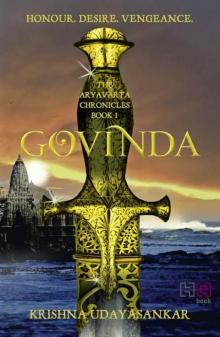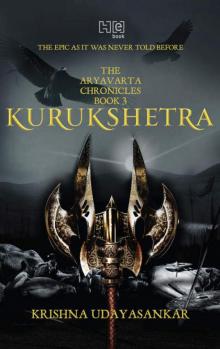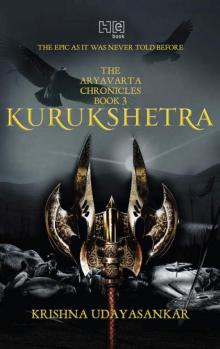- Home
- Krishna Udayasankar
The Aryavarta Chronicles Kurukshetra: Book 3 Page 12
The Aryavarta Chronicles Kurukshetra: Book 3 Read online
Page 12
‘I am aware of that,’ Govinda replied, ‘and I also remember that, once upon a time, it was I who had to persuade others to see things this way. And that is the point. If we are to talk of persuasion, of discussion, of a rule of the people, then this monolith of a system must be shaken, perhaps broken.’
‘Once upon a time, you say. Yes, it does feel like a story, Govinda, a story gone horribly wrong. And now you come to me…for what?’ Dwaipayana’s eyes held a churning rage that left his feeble body shaking.
Govinda waited for the scholar to compose himself before saying, ‘A trade. I need your help. But I do not ask of it as a favour; I have something to offer in return.’
‘And what is this wonderful trade you propose, Govinda?’
‘Give me the present, Acharya. In return, I will give you the future.’
‘Surely the future is not yours to give?’
‘But the present is yours to taunt me with?’
Dwaipayana smiled. ‘It is difficult to have the last word with you, so I shall not try. But would you care to move past metaphors and get to the point?’
‘The point is simple. I am a Firewright. I don’t know what you think my intent or interest is in your famed project of codifying the knowledge of all Aryavarta given the longstanding dispute between your Order and mine, but in the interest of clarity I wish to tell you.’
‘And what can you tell me that I haven’t already suspected, Govinda? That you would rather the knowledge of the Firewrights spread, untamed and undisciplined, to contaminate and destroy all notions of the Divine Order?’
‘Frankly, yes. But, you see, that does not leave me opposed to your great endeavour, your books of knowledge. I don’t care what you write or do not write, or how you wish to record all that has come to pass. I will neither thwart you nor question your wisdom in presenting and interpreting matters to your convenience. You will determine how the story of the Kurus, of this entire realm will be remembered. It will not matter whether there is war, and if there is one then who wins or loses – who rules as Emperor and who dies on the battlefield without honour or dishonour, as the situation may be. Your place in history, the place of your progeny, is secure for millennia to come. Is that not power over the future?’
‘Indeed, it is,’ Dwaipayana agreed. ‘And what is it you want in return?’
‘Before long, Dharma Yudhisthir will falter. Only you can give him what he needs to continue.’
‘To what end? War?’
‘The imminence of war. Though I hope it will not come to that.’
‘And if we refuse?’
The voice that intruded on the conversation was a strong, familiar one. Govinda did not have to turn to identify the speaker. ‘Acharya Suka,’ he said. ‘I am honoured that you join us. But, last I heard, you were at Hastina. You and your companions must have ridden hard to arrive so quickly.’
‘I am just in time, I gather.’ Suka walked over to where Dwaipayana was seated and greeted the older man with a respectful bow, which was received with an affectionate nod. He then took his place at Dwaipayana’s side, a hand on his father’s shoulder.
It could have been, Govinda noted, a sign of affection, though in all likelihood it was an order to the older man to show restraint. Suka continued, ‘So let me get this clear: Dharma Yudhisthir, the very epitome of righteousness, falls prey to your war-mongering, enough so to ally himself with Matsya, the heathen dregs of Aryavarta. He is a good man, enough so to realize his own mistake before the end, but – and this is where your audacity amazes, Govinda – you want my father to reassure Dharma and convince him to continue on his forsaken path? I’d call you insane if I didn’t know better, but really, I have no other explanation.’
‘Then let me explain,’ Govinda said. ‘Dharma stands exactly where all the rulers of Aryavarta stand, caught between our two warring orders. And Panchali… Panchali is Aryavarta, ravaged and wounded by our feud. I think it’s enough, Acharya.’
Suka said, ‘Really, Govinda, I am impressed. Had I been anyone else but who I am, I’d be moved by your rhetoric, possibly to the point of agreeing with you.’
‘It is not you who need be moved, Suka. Either by rhetoric, or more reasonable qualities such as compassion and justice. It is your father I have come to see. Unless he now needs your permission to act as his conscience dictates?’
It was a battle of both word and will, and Govinda knew it. He also knew he had played it well. Despite all his actions, Suka would not, could not, openly challenge his father’s positions. He would have to defer to Dwaipayana, though Govinda had no doubt that Suka would find his own means of later countering the Elder if he wished to. For the moment, Govinda’s point was made, and he knew better than to press it. He said, ‘Forgive me, Acharya. I spoke in error. Whatever our differences may be, I cannot, in good conscience, accuse you of being anything but a faithful, dutiful son. I trust you will understand that again, for all our differences, I remain convinced that Dwaipayana Vyasa acts in the interests of Aryavarta, and only in the interests of Aryavarta. All I humbly ask is that you help me resolve this situation without bloodshed.’
Dwaipayana said, ‘And how do you propose we do that?’
‘As I mentioned earlier, Dharma will need you. He will need your counsel. Most of all, he will need Dhrupad’s support, and only you can ensure that he secures it. This is the barter I come to make.’
‘It seems more a gamble than a barter, Govinda,’ Suka pointed out.
‘It seems I have learnt something from your dearest nephews, after all.’
‘So you want me…us…to help you bring Dharma to war, though you say your intent is not bloodshed. Your reasons are your own, Govinda, but how do you expect me to…’
‘It is no secret. I want Dharma to see… I want all of Aryavarta to see who stands by our side, who fights for us…and why.’
Suka sensed there was more to Govinda’s words than the obvious, but was not sure if it would help or hinder him to delve further into them, particularly in front of his father. He made a noncommittal gesture of understanding and said, ‘I’m sure my father would like some time to think on this matter…’
Govinda understood. He smiled and said, ‘Now, if you will permit me…’
Dwaipayana sighed and nodded. With a simple word of thanks, Govinda left.
Father and son waited till the sound of Govinda’s footsteps gave way to the sounds of a horse being untied, mounted and then ridden away. Only then did either of them stir.
‘Suka…’ Dwaipayana began. ‘Trust me, Father.’
‘But…’
‘Govinda is right. Dharma will need your urging to go on. And he will need to go on, to come to the very brink of battle before he sees, as does Syoddhan, that this whole war is nothing but an elaborate illusion constructed by the Firewrights to seduce the kings of the land into undermining their own power. For similar reasons, we must also convince Dhrupad that he is free to ally with his daughter and son-in-law, despite his ties and promises to Bhisma Devavrata.’
‘What purpose does that serve?’
‘By letting Dhrupad ally with Dharma, we lessen the difference in strength between Dharma’s armies and Syoddhan’s. The more equally matched the two opponents, the greater the chance that they will sue for peace instead of heading to war. Surely that is what we want?’
Dwaipayana’s eyes held doubt. ‘Is that what you want?’
Suka knelt and took his father’s wrinkled, gnarled hands into his own. ‘I want what you want, what your father wanted. An empire bound to Divine Order. But such order is now is at a precarious edge, and we must do all we can to keep the balance. Your personal differences with Bhisma apart, you trusted his allegiance enough to make him custodian of every Firewright weapon, of each astra that came into our hands during the Great Scourge. Can you trust his grandchildren the same way? And what about Dhrupad’s children? It is not who made the astra that matters, but rather who now wields it. Bhisma, Dron, Asvattama – their loyalty
to the Firstborn is beyond doubt.’
Dwaipayana studied his son, frowning as he tried to read Suka’s thoughts in his eyes. ‘What if, Suka…just what if…it comes to war? What will be said of us…that we acted to incite bloodshed when we ought to have acted to prevent it?’
‘No, Father. The imminence of war is but a means to an end, and not the only means. As for how posterity will judge us, our actions… Did Govinda not say, quite accurately, that you control the future? It is always the victor’s story that is told, Father. And we are going to win. Now, I hate to make a fuss, but it is time you rested. Sleep in peace. I am here now.’
Dwaipayana let his son settle him into a reclining position, and closed his eyes. Suka sat by his father’s side, his large, strong hands lovingly curled around Dwaipayana’s age-shrivelled fingers. His thoughts, however, rested on Govinda Shauri.
20
‘RUDRA BE PRAISED!’ SYODDHAN EXCLAIMED, AS ASVATTAMA LED him into yet another immaculately designed room in the royal palace of Indr-prastha. Most chambers they had surveyed had been large and airy, and designed to achieve balance between nature and the work of humans. What astounded Syoddhan about the particular room they had now moved into was the view that it offered.
From the high reaches of the royal palace, the city could be seen as more than just an aesthetic creation. Moving from room to room, Syoddhan had been able to appreciate the strategic layout of the city as a whole, its impregnable defences and ability to withstand long sieges being one of its numerous wonders. What he saw from the chamber they were in – a large, sparsely furnished room that provided a view in all directions – made him more certain of his ideas, and he said as much. ‘I’m not sure I agree with you, Asvattama. I was intrigued when Dhaumya initially kept asking for Indr-prastha on Dharma’s behalf, but I don’t think that is what Govinda ultimately wants. He built this city, he knows well that it is easily defended. Why not ask for it back?’
‘Patience. There is more to it than that.’ Asvattama said. ‘Indrprastha is brilliant in ways that I can’t begin to describe. The layout, the defences, the sheer beauty…these are things that can be seen, as you already have. But none of that shows you what this place truly holds.’
‘Which is?’
‘What if I told you that this city is a record, a comprehensive account, of all the scientific knowledge set down by the Firewrights?
‘A record…but where… You mean like a scroll?’
‘I mean, the city itself. Do you remember the fountains in the Coronation Hall?
Syoddhan clenched his teeth at the one memory of the Coronation Hall that he could not forget, the reason why, even now, he refused to enter the hall though he would gladly explore every nook and cranny of the city given half a chance. It was where his dearest friend Shisupala had been beheaded, by none other than Govinda Shauri. With effort, Syoddhan brought himself to focus on Asvattama’s words.
‘The fountains in the hall – there are hundreds of them – are each made in a different way; using a different mechanism… Or should I say, using every different mechanism that the Firewrights have detailed or discovered over the years for irrigation, or working grain mills using water, or…well…anything they’ve invented, really. In short, the city is a veritable demonstration of most known Firewright machinery, and some unknown. The beauty of it is how it is hidden while being in plain sight. Like an illusion. And that makes this whole place…’
‘A maya-sabha; a palace of illusions.’
‘Yes. And the greatest illusion of them all is that the Firewrights and their work is lost. Imagine, imagine the legacy of the Wrights left in plain sight, as part of all that is everyday and mundane. Imagine it filling, enriching our lives, though we may not know it. And then imagine a Secret Keeper who continues to work in anonymity, to make sure that this comes to pass…’
‘Did you find it?’ Syoddhan interrupted, something he would not ordinarily have done while Asvattama spoke. This once though, he could not hold back, irritated as he was by how a stoic, restrained man had turned into a gushing youth in front of his eyes. His tone brought Asvattama back to his immediate surroundings.
‘No,’ Asvattama said. ‘No trace of the Naga-astra. But that’s the thing, Syoddhan. There is not a single piece of information, in any form, about any Wright-weapon, leave alone the Naga-astra. I have personally been over every thumb-length of this city and have found nothing, nothing at all that relates to weapon-making or battle strategy, not even a distant reference.’
‘That makes no sense!’ Syoddhan said. ‘Why give form to nearly all of the Firewrights’ knowledge, but leave out the one thing that made them so mighty?’
‘Because it made them mighty.’
‘Don’t be dense.’
Asvattama chuckled. ‘It is not for me to criticize our elders. My father – your teacher – and Grandsire Bhisma among them. But the truth of the matter is that those who were part of the Great Scourge destroyed only what they could not take for themselves or that which they did not need. The Kurus, for example, cared little for irrigation mechanisms – after all, your land is one of the most fertile tracts in all Aryavarta. At the same time, to let others benefit from those inventions could reduce their reliance on Kuru – in turn reducing Kuru power. No doubt, our elders have acted to ensure the undiminished glory of your kingdom. Their intentions may have been noble, and this is how they considered their actions justified. Be that as it may, those we reckon as the great rulers of Aryavarta were all leaders of the Great Scourge, or else are their descendants and pupils.’
Syoddhan resented the implications in Asvattama’s words, and he let it show. ‘Their actions were justified. It is our duty as rulers to guard evil from itself. If we do not take control of the source of great power, we risk it falling into the wrong hands.’
‘Like Jarasandha’s? He held no affection for the Firewrights, nor did he have any allegiance to the Firstborn. That sufficed for Vyasa Dwaipayana to condone the way he was killed… If it weren’t for Jarasandha, a Kuru would have become emperor a long time ago, isn’t it?’
‘Your point being…?’
‘What if the Wrights knew… What if they had the courage to destroy that part of themselves they believed bred hatred and violence, and wanted to leave only that part of their knowledge that added to peace and prosperity. What if Govinda Shauri was no traitor, but one such rebel? Does that not change things completely?’
Syoddhan considered the point. He did not want to admit it aloud, but the proposition did explain most of what Govinda had done over the years. It didn’t, however, explain why he would now risk all his plans simply to prove a point in Dharma’s favour. Out loud, Syoddhan said, ‘What if he wasn’t? Would you still want me to make peace with such a man? Or maybe you will! You can’t hide it anymore, can you? There is a Firewright within you, there always has been, and now to see Indr-prastha, to see their plan to rise again and come to life… You can’t resist the temptation any longer, can you?’
Asvattama’s voice was stern when he said, ‘We’re too old to fight like children, Syoddhan, so why don’t you just shut up, and I won’t have to hit you.’
Syoddhan stared at the other man for what felt to him like a long time and then let out a tired sigh. His rage of moments ago was gone, and with it the memory of his accusations. As though their conversation had been as before, he continued, ‘Old is right. I feel it. I feel it in every bone.’ He looked pointedly at Asvattama. ‘It has taken me a long time to understand one fundamental truth, my friend. You see, many of those we might reckon as our enemies are not, for they share the same beliefs as we do, they want the same thing as us. Trust me, I know Dharma Yudhisthir from youth, and I could wager my life that no man believes more strongly in Divine Order and our destined role as its caretakers than he does. Yet, he and I have different views on the best means to achieve this end, and it is that difference that men like Govinda seek to exploit. That Dharma allows himself to be manipulated, that his princip
les are so malleable, is what makes me think of him as my enemy, and a more dangerous one than Govinda Shauri. Does that make sense?’
‘It does. Govinda believes in sharing the power of the Firewrights with the masses, while you believe such power is best fettered and kept in control, tempered jointly by the Firstborn and the kings of Aryavarta. It is a difference of principle, but as individuals you are both fundamental in intent. Dharma, on the other hand, claims to share your principle, but is willing to forsake it in order to achieve what he considers greater ends.’
‘Correct. So whose war is this? Dharma’s or Govinda’s? Not that I care about the nature of my enemy, but unless I know who it truly is, planning against them is difficult. Which brings us back to your suggestion that Dharma’s forces will march against Indr-prastha. Govinda was willing to settle for a village when he came to barter peace. That doesn’t sound like a man who aspires to take this city.’
‘That doesn’t sound like a man I’d trust, either.’
Syoddhan said, ‘Clearly, you are not the only one. Sudhakshin of Kashi has already declared that he fights for us. In fact, he wants to know if he should direct his men to Hastina or Indr-prastha.’
‘But you haven’t called for an open muster yet…’
‘Call or not, he has come forward. His men are already marching eastward, and Dasarna’s king has allowed them to pass through his lands – which shows where he stands.’
‘With the Kurus,’ Asvattama said.
‘Or against Southern Panchala, at the very least. But if we want to gather the men here, at Indr-prastha and not Hastina, then it might be better to get them to move through your realm, Northern Panchala.’
‘Hmm. I’d suggest you think further on that. Indr-prastha has one weakness, Syoddhan. It is impregnable, it can withstand siege, it can outlast any enemy. But what it cannot do is support a huge army – which I suppose is another defence in itself.’
‘Surely that is an advantage.’
‘From a military perspective, yes. From a political perspective, however… As it stands, your men and mine form the city’s army, and they are as much as we can manage to have here. If Govinda attacks in Dharma Yudhisthir’s name, he will do so with the might of Matsya and, we should assume, Panchala behind him.’

 Govinda (The Aryavarta Chronicles)
Govinda (The Aryavarta Chronicles) The Aryavarta Chronicles Kaurava: Book 2
The Aryavarta Chronicles Kaurava: Book 2 The Aryavarta Chronicles Book 03: Kurukshetra
The Aryavarta Chronicles Book 03: Kurukshetra The Aryavarta Chronicles Kurukshetra: Book 3
The Aryavarta Chronicles Kurukshetra: Book 3